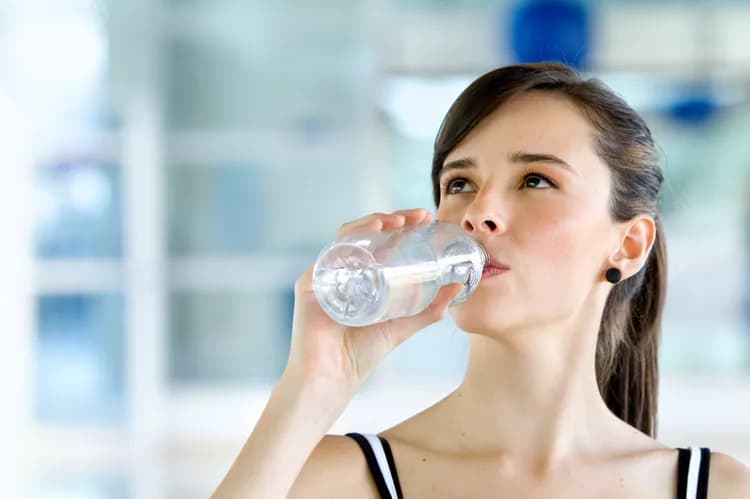Many know that drinking water and staying hydrated has many health benefits, but not too many understand that proper hydration is necessary for weight regulation. Water makes up two-thirds of your body and plays many key roles in body functions such as removing waste products, regulating body temperature, and lubricating the joints. An additional benefit of drinking water is that it can naturally suppress your appetite and improve your body’s metabolism.
A study performed at the University of Washington found that drinking one 8-ounce glass of water abolished midnight hunger pains in 98% of the participants. This reduced the caloric intake from midnight snacks in each of the participants.
Water may also give you an energy boost, allowing you to keep pushing through intense workouts and burn more calories. The Journal of Clinical Endocrinology and Metabolism circulated a study exploring the thermogenic effect of water. They concluded that drinking 16 ounces of water caused a 30% increase in metabolism, mostly linked to the body warming the water to body temperature.
Proper hydration can also help your body differentiate between hunger and thirst. Sometimes, your body is confused between the two and makes you think you need to eat more, when, in fact, you are just thirsty. Drinking a glass of water right before a meal can help you eat less food and make you feel fuller than if you did not drink water before the meal.
Research presented at the 240th National Meeting of the American Chemical Society (ACS) found that middle-aged and older people ate between 75 and 90 calories lesser with each meal when they drank two cups of water right before their meal. In addition, food with high water content takes up more volume in the stomach, requires more chewing, and helps the body absorb food more slowly.
A diet rich in fiber is essential for weight loss, but fiber cannot do it alone. Water consumption is the other team member to a healthy gastrointestinal tract. Drinking a lot of water keeps food flowing through your digestive tract and prevents constipation and bloating. Bloating is any abnormal increase in diameter of the abdominal area.
Though it is rare, it is possible to go overboard on drinking water. Water intoxication, or hyponatremia, is a serious condition in which blood sodium levels drop quickly through excessive sweating and drinking way too much water (instead of drinks with electrolytes), while not eating or urinating. Water intoxication could happen to someone who engages in a long athletic event such as a marathon; symptoms include confusion, disorientation, weakness, and nausea. Abnormal blood levels or hyponatremia can lead to seizures, coma, and even death, without immediate medical attention.
Try eating foods with a high water content. Though there is still debate as to how much water each person should drink daily, be sure to drink water whenever you are feeling thirsty or hungry to stay hydrated.
Additional Resources:
Boschmann, M., Steiniger, J., Hille, U., Tank, J., Adams, F., Sharma, A. M., ... & Jordan, J. (2003). Water-induced thermogenesis. The Journal of Clinical Endocrinology & Metabolism, 88(12), 6015-6019.
Cannon, W. B. (1929). Hunger and thirst.
Cummings, J. H. (1984). Constipation, dietary fibre and the control of large bowel function. Postgraduate medical journal, 60(709), 811.
DellaValle, D. M., Roe, L. S., & Rolls, B. J. (2005). Does the consumption of caloric and non-caloric beverages with a meal affect energy intake?. Appetite,44(2), 187-193.
McKenney, J. A. (1946). The physiologic use of water in constipation.American Journal of Digestive Diseases, 13(3), 78-80.
Molden, D., Oweis, T., Steduto, P., Bindraban, P., Hanjra, M. A., & Kijne, J. (2010). Improving agricultural water productivity: between optimism and caution. Agricultural Water Management, 97(4), 528-535.
Noakes, T. D., Goodwin, N. E. I. L., Rayner, B. L., Branken, T. R. E. V. O. R., & Taylor, R. K. (1985). Water intoxication: a possible complication during endurance exercise. Medicine and science in sports and exercise, 17(3), 370-375.
Rolls, B. J., Bell, E. A., & Thorwart, M. L. (1999). Water incorporated into a food but not served with a food decreases energy intake in lean women. The American journal of clinical nutrition, 70(4), 448-455.
Helpful Peer-Reviewed Medical Articles:
Oppliger, R. A., & Bartok, C. (2002). Hydration testing of athletes. Sports Medicine, 32(15), 959-971.
Jéquier, E., & Constant, F. (2010). Water as an essential nutrient: the physiological basis of hydration. European journal of clinical nutrition, 64(2), 115-123.
Ritz, P., & Berrut, G. (2005). The importance of good hydration for day-to-day health. Nutrition reviews, 63(suppl 1), S6-S13.
Popkin, B. M., D'Anci, K. E., & Rosenberg, I. H. (2010). Water, hydration, and health. Nutrition reviews, 68(8), 439-458.
Judelson, D. A., Maresh, C. M., Anderson, J. M., Armstrong, L. E., Casa, D. J., Kraemer, W. J., & Volek, J. S. (2007). Hydration and muscular performance. Sports Medicine, 37(10), 907-921.
Related Articles
Test Your Knowledge
Asked by users
Related Centers
Related Specialties
Related Physicians
Related Procedures
Related Resources
Join DoveHubs
and connect with fellow professionals


0 Comments
Please log in to post a comment.